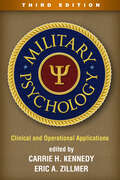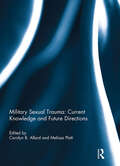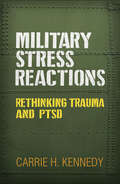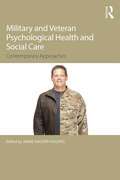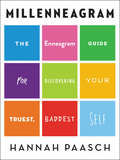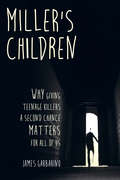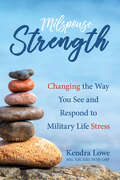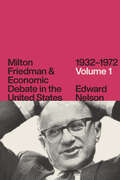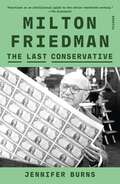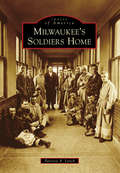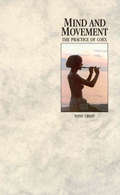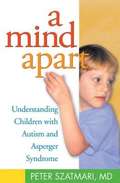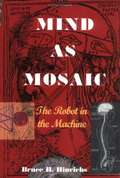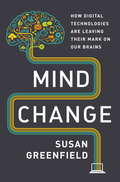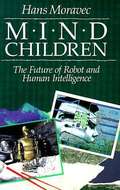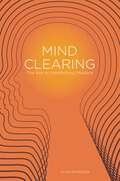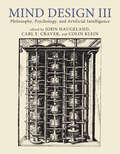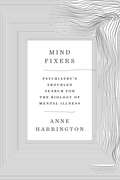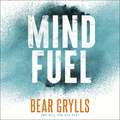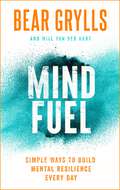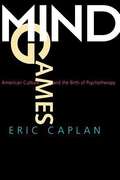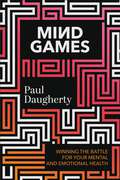- Table View
- List View
Military Psychology, Third Edition: Clinical and Operational Applications
by Carrie H. Kennedy and Eric A. ZillmerWith more than 60% new material reflecting advances in evidence-based treatments and the evolving roles of military mental health providers, the authoritative resource in the field is now in a significantly revised third edition. The volume provides research-based roadmaps for prevention and intervention with service members and veterans in a wide range of settings. Up-to-date information about military procedures and guidelines is included throughout. Grounded in current knowledge about stress and resilience, chapters describe best practices in treating such challenges as depression, anxiety disorders, posttraumatic stress disorder, and substance use disorders. Also addressed are operational functions of psychologists in personnel assessment and selection, counterintelligence, and other areas. New to This Edition *Chapters on new topics: the spectrum of military stress reactions, concussion management, military sexual assault, embedded/expeditionary psychological practice, and security clearance evaluations. *Fully rewritten chapters on evidence-based treatments, behavioral health in primary care, and disaster mental health. *Incorporates major shifts in how and where military mental health services are delivered.
Military Sexual Trauma Current Knowledge and Future Directions
by Carolyn B. Allard Melissa PlattMilitary Sexual Trauma: Current Knowledge and Future Directions showcases the work of several prominent military sexual trauma (MST) researchers, scholars, and clinicians from across the United States. A review of existing research and original empirical findings converge to indicate that MST contributes to a range of physical health problems, complex posttraumatic responses, and other mental health consequences above and beyond the effects of other types of traumatic experiences. This collection also presents evidence suggesting that MST is often difficult to identify both within the individual military member and within the military population as a whole. Recommendations are offered for addressing this problem. In addition to the research review and empirical findings, an evolutionary framework for understanding sexual assault of women in the military is presented. Taken together, this collection of works may inform MST intervention and prevention efforts. This book was originally published as a special issue of Journal of Trauma & Dissociation.
Military Social Work Around the Globe (Military and Veterans Studies)
by Mary Ann Forgey Karen Green-HurdleThis is the first book to focus on the scope of social work practice within military settings from an international perspective, and therefore addresses what has been a significant gap in the literature. Given the critical support needs of military personnel and their families worldwide, and the expanding role of social work in responding to these needs, this book offers a comprehensive global understanding of the common military social work (MilSW) practices with active duty military service members and their families, as well as the forms of practice and approaches that are unique, or potentially transferable across nations.Based on a systematic inquiry conducted by the Editors, there are at least 25 countries that have social workers working directly within their country’s military in either a civilian or uniformed capacity, or both. This book includes contributions from experts in Australia, Canada, Denmark, Finland, Ireland, Israel, the Netherlands, New Zealand, South Africa, the UK, and the USA, who describe various aspects of the MilSW role within their country and the research that informs what military social workers do. The MilSW similarities and differences among these countries are highlighted, including developmental milestones, practice settings, practice orientation and approach, ethical dilemmas, military to veteran transition support, and past and current challenges. Experts from countries that do not yet have MilSW but are interested in developing it (Japan, Ukraine) or are in the process of establishing this area of practice (Slovakia), also contribute chapters about these developments and the evidence base that supports this direction.Military Social Work Around the Globe is a valuable resource for social work programs and essential reading for instructors and students in MilSW electives and specializations. It is also pertinent reading for occupational social work and international social work courses. In addition, this book is an important source of information for military social workers who would like to gain insights into existing programs and the possibilities for international collaboration, and for countries interested in developing MilSW.
Military Stress Reactions: Rethinking Trauma and PTSD
by Carrie H. KennedyMany people--including some mental health professionals and service members themselves--have the misconception that military deployment is highly likely to cause posttraumatic stress disorder (PTSD). This book gives practitioners a more nuanced understanding of military stress reactions and related mental health concerns, from transient adjustment problems to clinical disorders. Drawing on expert knowledge of military environments and culture, Carrie H. Kennedy provides vital guidance for evidence-based assessment, intervention, and prevention. Kennedy emphasizes that overdependence on the diagnosis of PTSD can lead to suboptimal care, and shows how to tailor treatment to each service member's or veteran's needs. A crucial addition to any practitioner's library, the book is illustrated with numerous case vignettes.
Military Veteran Psychological Health and Social Care: Contemporary Issues
by Jamie Hacker HughesWhen servicewomen and men leave the armed forces, their care transfers to the statutory and third sector where the quality and provision of services can vary enormously. This edited book, encompassing a range of perspectives, from service user to professional, provides a comprehensive overview of services available. Each chapter, in turn, examines the policy underpinnings of systems and services covering the psychological health and social care of military veterans and then focuses on the needs of a discrete number of types of military veterans including early service leavers, veterans in the criminal justice system, older veterans and reservists, together with the needs of the children of veterans’ families. This is the first UK book to examine the whole spectrum of contemporary approaches to the psychological health and social care of military veterans both in the United Kingdom and overseas. The book is edited by Professor Jamie Hacker Hughes, a former head of healthcare psychology within the UK Ministry of Defence and all contributors are experts in policy, service provision and academic research in this area. It will be of special interest to those designing and planning, commissioning, managing and delivering mental health and social care to military veterans and their families
Millenneagram: The Enneagram Guide for Discovering Your Truest, Baddest Self
by Hannah PaaschBuckle up, folks. It’s time to jump in, embrace your inner self, and release the things that are holding you back from wholeness. Enter the Millenneagram.The Enneagram is an ancient personality typing system that has a sneaky way of revealing who we are and why we do the things we do. Using nine types, it gets to the root of our fears and motivations, unveiling our inner-most selves. Millenneagram reinvigorates the Enneagram by putting a modern spin on the classic nine types. Hannah Paasch, creator of the popular #millenneagream threads on Twitter, reveals how this system acts as a map toward our authentic selves. For Hannah, the Enneagram is not about changing who we are, but rather nurturing and loving our whole selves, even the pain in the ass qualities. “Only from this position of wholeness, rootedness in who we are, what we believe, and what kind of story we are writing, will we be able to act bravely for the sake of justice and humanity – to approach our f*cked-up world with the grounded courage it asks of us.”With her trademark irreverent humor and empowering affirmations, Millenneagram reframes the classic Enneagram types with a fresh perspective and new names that cut right to the chase: #1 The Machine “I’m an Enneagram 1 and I Can Fix This!”#2 The Parent “I’m an Enneagram 2 and Can I Get You a Refill?”#3 The Winner “I’m an Enneagram 3 and All I Do Is Win.”#4 The Tortured Artist “I’m an Enneagram 4 and I’m Deeper Than You.”#5 The Detective “I’m an Enneagram 5 and I Read an Article About That.”#6 The Oracle “I’m an Enneagram 6 and I’m Loyal as Fuck.”#7 The Party “I’m an Enneagram 7 so This Might Be Vodka In My Mug.”#8 The Dragon “I’m an Enneagram 8 so Nice Try, Bitch.”#9 The Wallflower “I’m an Enneagram 9 so Let’s Just All Chill Out, Dude.”A powerful tool for self-discovery (that doesn’t take itself too seriously), Millenneagram is an invitation for introspection and growth. Hannah’s revamped Enneagram goes beyond simply identifying with a type: it gives us permission to be our truest, enough-as-is, bad-ass selves.
Miller's Children: Why Giving Teenage Killers A Second Chance Matters For All Of Us
by James GarbarinoMiller’s Children is a passionate and comprehensive look at the human consequences of the US Supreme Court’s decision in the case of Miller v. Alabama, which outlaws mandatory life-without-parole sentences for juvenile murderers. The decision to apply the law retroactively to other cases has provided hope to those convicted of murders as teenagers and had been incarcerated with the expectation that they would never leave prison until their own death as incarcerated adults. Psychological expert witness James Garbarino shares his fieldwork in more than forty resentencing cases of juveniles affected by the Miller decision. Providing a wide-ranging review of current research on human development in adolescence and early adulthood, he shows how studies reveal the adolescent mind’s keen ability for malleability, suggesting the true potential for rehabilitation. Garbarino focuses on how and why some convicted teenage murderers have been able to accomplish dramatic rehabilitation and transformation, emphasizing the role of education, reflection, mentoring, and spiritual development. With a deft hand, he shows us the prisoners’ world that is filled, first and foremost, with stories of hope amid despair, and moral and psychological recovery in the face of developmental insult and damage.
Millionaire
by Jolanta GebkaThis book is about the life events of given people (the heroine of the novel). This book is about the life events of given people (the heroine of the novel). She won the main lottery. The story was shown in the magic of the film. The book is morale. She won the main lottery. The story was shown in the magic of the film.
Milspouse Strength: Changing the Way You See and Respond to Military Life Stress
by Kendra LoweMilitary spouses: Transform your military life stress into strength! "... a must-read for military spouses ... to learn and understand the circumstances and harm of stress, the outcome and capabilities of the mind, and the tools, questions, and reflections to manage through it all."—Sabina W. Zarlenga, MS, LPCC, NCC, CCTP, Army spouse Do you feel like you are constantly adjusting your life over and over again? As if the underlying stress of your service member's dangerous missions or the lengthy separations during deployments aren't enough. Each new assignment brings another relocation, potential job search, school changes, and more. It's easy to feel overwhelmed and believe that a life of constant stress is the norm for military spouses. But cumulative stress hugely impacts your life! In Milspouse Strength, author Kendra Lowe, a veteran, military spouse, and trained psychologist, helps you understand the impact of both positive and negative stress, healthy ways to respond to stressful situations, and ultimately how to transform your stress into strength. The information, tools, and reflection questions will help you break down the individual stresses that weigh on your mind so you can feel in control of your life right now and develop the skills to change the way you see and respond to military life stress. "Truly outstanding! ... Kendra captures the true essence of being a military spouse: the challenges, the resilience, the stress, and the rewards. She then goes on to give tangible information to deal with the stress successfully." —Robyn Grable, US Navy veteran, military spouse, CEO of Veterans ASCEND Features: • Information about different types of stress • Tools for assessing stress levels and their impact • Stories and perspective from other military spouses • Reflection questions in each chapter Encouraging ~ Informative ~ All Service Branches
Milton Friedman and Economic Debate in the United States, 1932–1972, Volume 1 (Milton Friedman & Economic Debate in the United States)
by Edward NelsonMilton Friedman is widely recognized as one of the most influential economists of the twentieth century. Yet no previous study has distilled Friedman’s vast body of writings into an authoritative account of his research, his policy views, and his interventions in public debate. With this ambitious new work, Edward Nelson closes the gap: Milton Friedman and Economic Debate in the United States is the defining narrative on the famed economist, the first to grapple comprehensively with Friedman’s research output, economic framework, and legacy. This two-volume account provides a foundational introduction to Friedman’s role in several major economic debates that took place in the United States between 1932 and 1972. The first volume, which takes the story through 1960, covers the period in which Friedman began and developed his research on monetary policy. It traces Friedman’s thinking from his professional beginnings in the 1930s as a combative young microeconomist, to his wartime years on the staff of the US Treasury, and his emergence in the postwar period as a leading proponent of monetary policy. The second volume covers the years between 1960 and 1972— years that saw the publication of Friedman and Anna Schwartz’s Monetary History of the United States. The book also covers Friedman’s involvement in a number of debates in the 1960s and 1970s, on topics such as unemployment, inflation, consumer protection, and the environment. As a fellow monetary economist, Nelson writes from a unique vantage point, drawing on both his own expertise in monetary analysis and his deep familiarity with Friedman’s writings. Using extensive documentation, the book weaves together Friedman’s research contributions and his engagement in public debate, providing an unparalleled analysis of Friedman’s views on the economic developments of his day.
Milton Friedman: The Last Conservative
by Jennifer BurnsAn Economist Best Book of 2023 | One of The New York Times’ 33 Nonfiction Books to Read This Fall | Named a most anticipated fall book by the Chicago Tribune and Bloomberg | Finalist for the 2024 Hayek Book Prize“Wherever you sit on the political spectrum, there’s a lot to learn from this book. More than a biography of one controversial person, it’s an intellectual history of twentieth-century economic thought.” —Greg Rosalesky, NPR’s Planet Money The first full biography of America’s most renowned economist.Milton Friedman was, alongside John Maynard Keynes, the most influential economist of the twentieth century. His work was instrumental in the turn toward free markets that defined the 1980s, and his full-throated defenses of capitalism and freedom resonated with audiences around the world. It’s no wonder the last decades of the twentieth century have been called “the Age of Friedman”—or that analysts have sought to hold him responsible for both the rising prosperity and the social ills of recent times.In Milton Friedman, the first full biography to employ archival sources, the historian Jennifer Burns tells Friedman’s extraordinary story with the nuance it deserves. She provides lucid and lively context for his groundbreaking work on everything from why dentists earn less than doctors, to the vital importance of the money supply, to inflation and the limits of government planning and stimulus. She traces Friedman’s long-standing collaborations with women, including the economist Anna Schwartz; his complex relationships with powerful figures such as the Federal Reserve chairman Arthur Burns and the Treasury secretary George Shultz; and his direct interventions in policymaking at the highest levels. Most of all, Burns explores Friedman’s key role in creating a new economic vision and a modern American conservatism. The result is a revelatory biography of America’s first neoliberal—and perhaps its last great conservative.
Milwaukee's Soldiers Home (Images of America)
by Patricia A. LynchAs the country sought healing and peace after the Civil War, Wisconsin citizens took up Pres. Abraham Lincoln's challenge "to care for him who shall have borne the battle." Their efforts paved the way for the establishment in Milwaukee of one of the original three branches of the National Asylum for Disabled Volunteer Soldiers. In May 1867, the first 60 veterans, including a musician from the War of 1812, moved to a single building on 400 rolling acres west of Milwaukee. By the end of the 19th century, the bustling campus boasted its own hospital, chapel, library, theater, and recreation hall, in addition to the grand main building. Subsequent wars and military conflicts created a need for additional buildings and services. Designated a National Historic Landmark in 2011, the campus continues to offer a healing environment for today's patients and stands as a testimony to advances in veteran health care.
Mind And Movement: The Practice of Coex
by Tony CrispBy using body movements and postures as doorways to our own natural healing process, we can actively release tension; find balance between the mind and the body; learn to dream creatively while awake; and tap areas of the unconscious thought unaccesible.Most physical movements and exercise are disconnected from our deepest drives, feelings and sources of healing. MIND AND MOVEMENT shows how to find a natural way healthy to healthy exercise and spiritual growth. The method of co-operating with our own internal healing and creativity has been known and used for centuries. In Japan it is called Seitai, in India Shaktipat; even the early Christian used this simple form of inner and outer hygiene.Recent research has linked this activity with the self-regulatory and dream proces within us. But, no other book has made plain to the public how to co-operate with these internal functions for one's own benefit.Tony Crisp has been writing about natural health and self help for thirty years. His special interest in the healing potential of the dream process led him to work as a therapist during the past fourteen years. It is out of this experience MIND AND MOVEMENT was written.
Mind Apart
by Peter SzatmariWhy would a child refuse to talk about anything but wasp wings-or the color of subway train doors? What does it mean when a nine-year-old asks questions about death hundreds of times a day? And how can parents build a close relationship with a little girl who hates to be touched? In this compassionate book, leading autism authority Dr. Peter Szatmari shows that children with autism spectrum disorders act the way they do because they think in vastly different ways than other people. Dr. Szatmari shares the compelling stories of children he has treated who hear everyday conversation like a foreign language or experience hugs like the clamp of a vise. Understanding this unusual inner world-and appreciating the unique strengths that thinking differently can bestow-will help parents relate to their children more meaningfully, and make the "outer world" a less scary place.
Mind As Mosaic: The Robot In The Machine
by Bruce H. HinrichsMind as Mosaic: The Robot in the Machine is a beguiling introduction to how the mind is created by the brain. With clarity, humor and poetry, Mind as Mosaic mixes history, biology, philosophy, artificial intelligence, and psychology in fresh, cutting-edge and insightful reading.People who drill holes in their heads, cannibals, electrical stimulation of brains, people who are blind but don't know it, and other absorbing and intriguing wonders are presented and explained in an uncompromisingly honest style that is compelling and accessible.Packed with startling and riveting examples and clear explanations of how the mind is robotically formed by brain processes, Mind as Mosaic is science wrapped in humanity, facts laced with wit, philosophy in a white laboratory coat. The subject is not only fun, it is profound.
Mind Change
by Susan GreenfieldWe live in a world unimaginable only decades ago: a domain of backlit screens, instant information, and vibrant experiences that can outcompete dreary reality. Our brave new technologies offer incredible opportunities for work and play. But at what price? Now renowned neuroscientist Susan Greenfield--known in the United Kingdom for challenging entrenched conventional views--brings together a range of scientific studies, news events, and cultural criticism to create an incisive snapshot of "the global now." Disputing the assumption that our technologies are harmless tools, Greenfield explores whether incessant exposure to social media sites, search engines, and videogames is capable of rewiring our brains, and whether the minds of people born before and after the advent of the Internet differ. Stressing the impact on Digital Natives--those who've never known a world without the Internet--Greenfield exposes how neuronal networking may be affected by unprecedented bombardments of audiovisual stimuli, how gaming can shape a chemical landscape in the brain similar to that in gambling addicts, how surfing the Net risks placing a premium on information rather than on deep knowledge and understanding, and how excessive use of social networking sites limits the maturation of empathy and identity. But Mind Change also delves into the potential benefits of our digital lifestyle. Sifting through the cocktail of not only threat but opportunity these technologies afford, Greenfield explores how gaming enhances vision and motor control, how touch tablets aid students with developmental disabilities, and how political "clicktivism" foments positive change. In a world where adults spend ten hours a day online, and where tablets are the common means by which children learn and play, Mind Change reveals as never before the complex physiological, social, and cultural ramifications of living in the digital age. A book that will be to the Internet what An Inconvenient Truth was to global warming, Mind Change is provocative, alarming, and a call to action to ensure a future in which technology fosters--not frustrates--deep thinking, creativity, and true fulfillment.Praise for Mind Change "This is just the book we need now as we proceed to absorb fresh digital innovations: a scientific review of their effects on the brain and what they mean for our minds. Mind Change clearly presents to lay readers the latest experimental findings as Susan Greenfield brings to the digital revolution just the right level of skepticism and curiosity. Neither a naysayer nor an enthusiast, she is a sober, reliable, and engaging voice on screen experience, telling us what happens inside our heads each time we log on, connect, play, and emote."--Mark Bauerlein, author of The Dumbest Generation: How the Digital Age Stupefies Young Americans and Jeopardizes Our Future (Or, Don't Trust Anyone Under 30) "Greenfield's Mind Change . . . proposes that global climate change can serve as a useful metaphor for how human minds--our inner environments--are, in her view, being recklessly altered by digital technologies. . . . Mind Change is an important presentation of an uncomfortable minority position."--Jaron Lanier, Nature "Greenfield is a lucid and thorough communicator, and this book is highly accessible to those with no knowledge of neuroscience. . . . That I kept being distracted from my reading to check Facebook was less a reflection on the quality of the book than a sobering lesson in how relevant these issues are."--The Independent (U.K.)From the Hardcover edition.
Mind Children: The Future of Robot and Human Intelligence
by Hans MoravecArguing that within the next fifty years machines will equal humans not only in reasoning power but also in their ability to perceive, interact with, and change their environment, the author describes the tremendous technological advances possible in thefield of robotics.
Mind Clearing: The Key to Mindfulness Mastery
by Alice Whieldon Lawrence NoyesMind Clearing (MC) builds on mindfulness approaches, with the ultimate aim of reducing suffering caused by mental, emotional, relationship and spiritual distress, through clearing the mind. This book offers a fresh approach for mental and physical health practitioners wishing to expand their practice and for individuals wanting to improve health and happiness at a fundamental level. The first book to explore Mind Clearing within the context of modern practice, this book looks at its origins, key principles and interpretations to aid understanding of the approach. With examples from practice and clear guidelines on the 'Do's and Don'ts' of Mind Clearing, practitioners and individuals will feel confident in carrying out the approach, and will learn to communicate effectively by dissolving the mind and the projections and fixed attitudes that it represents.
Mind Design III: Philosophy, Psychology, and Artificial Intelligence
by John Haugeland, Carl F. Craver, and Colin KleinThe essential reader on the philosophical foundations and implications of artificial intelligence, now comprehensively updated for the twenty-first century.In the quarter century since the publication of John Haugeland&’s Mind Design II, computer scientists have hit many of their objectives for successful artificial intelligence. Computers beat chess grandmasters, driverless cars navigate streets, autonomous robots vacuum our homes, and ChatGPT answers existential queries in iambic pentameter on command. Engineering has made incredible strides. But have we made progress in understanding and building minds? Comprehensively updated by Carl Craver and Colin Klein to reflect the astonishing ubiquity of machine learning in modern life, Mind Design III offers an essential collection of classic and contemporary essays on the philosophical foundations and implications of artificial intelligence. Contributions from a diverse range of philosophers and computer scientists address the nature of computation, the nature of thought, and the question of whether computers can be made to think. With extensive new material reflecting the explosive growth and diversification of AI approaches, this classic reader equips students to assess the possibility of, and progress toward, building minds out of computers.New edition highlights: New chapters on advances in deep neural networks, reinforcement learning, and causal learningNew material on the complementary intersection of neuroscience and AIOrganized thematically rather than chronologically Brand new introductions to each section that include suggestions for coursework and further reading
Mind Fixers: Psychiatry's Troubled Search For The Biology Of Mental Illness
by Anne HarringtonMind Fixers tells the history of psychiatry’s quest to understand the biological basis of mental illness and asks where we need to go from here. <P><P> In Mind Fixers, Anne Harrington, author of The Cure Within, explores psychiatry’s repeatedly frustrated struggle to understand mental disorder in biomedical terms. She shows how the stalling of early twentieth century efforts in this direction allowed Freudians and social scientists to insist, with some justification, that they had better ways of analyzing and fixing minds. But when the Freudians overreached, they drove psychiatry into a state of crisis that a new “biological revolution” was meant to alleviate. Harrington shows how little that biological revolution had to do with breakthroughs in science, and why the field has fallen into a state of crisis in our own time. <P><P>Mind Fixers makes clear that psychiatry’s waxing and waning biological enthusiasms have been shaped not just by developments in the clinic and lab, but also by a surprising range of social factors, including immigration, warfare, grassroots activism, and assumptions about race and gender. Government programs designed to empty the state mental hospitals, acrid rivalries between different factions in the field, industry profit mongering, consumerism, and an uncritical media have all contributed to the story as well. <P><P>In focusing particularly on the search for the biological roots of schizophrenia, depression, and bipolar disorder, Harrington underscores the high human stakes for the millions of people who have sought medical answers for their mental suffering. This is not just a story about doctors and scientists, but about countless ordinary people and their loved ones. A clear-eyed, evenhanded, and yet passionate tour de force, Mind Fixers recounts the past and present struggle to make mental illness a biological problem in order to lay the groundwork for creating a better future, both for those who suffer and for those whose job it is to care for them.
Mind Fuel: Simple Ways to Build Mental Resilience Every Day
by Bear GryllsThe world's most recognised adventurer Bear Grylls offers daily tips to help you build mental resilience.Bear Grylls draws on his survival experience to share the principles that have helped him overcome fear, develop a positive mindset and break through the obstacles that limit success in everyday life. With emotional health advocate Will Van Der Hart, MIND FUEL offers you practical insights to help you to increase your resilience, combat stress and live life with confidence.Topics are categorised into eight broader themes at enable you to access the material you need most - covering wisdom, battles, motivation, courage, relationships, self-care, spirituality and determination. From the bestselling author of Mud, Sweat and Tears, MIND FUEL gives you a whole year's worth of guidance to face whatever life throws at you.(P) 2022 Hodder & Stoughton Limited
Mind Fuel: Simple Ways to Build Mental Resilience Every Day
by Bear GryllsThe world's most recognised adventurer Bear Grylls offers daily tips to help you build mental resilience.Bear Grylls draws on his survival experience to share the principles that have helped him overcome fear, develop a positive mindset and break through the obstacles that limit success in everyday life. With emotional health advocate Will Van Der Hart, MIND FUEL offers you practical insights to help you to increase your resilience, combat stress and live life with confidence. Topics are categorised into eight broader themes at enable you to access the material you need most - covering wisdom, battles, motivation, courage, relationships, self-care, spirituality and determination. From the bestselling author of Mud, Sweat and Tears, MIND FUEL gives you a whole year's worth of guidance to face whatever life throws at you.
Mind Fuel: Simple Ways to Build Mental Resilience Every Day
by Bear GryllsThe world's most recognised adventurer Bear Grylls offers daily tips to help you build mental resilience.Bear Grylls draws on his survival experience to share the principles that have helped him overcome fear, develop a positive mindset and break through the obstacles that limit success in everyday life. With emotional health advocate Will Van Der Hart, MIND FUEL offers you practical insights to help you to increase your resilience, combat stress and live life with confidence. Topics are categorised into eight broader themes at enable you to access the material you need most - covering wisdom, battles, motivation, courage, relationships, self-care, spirituality and determination. From the bestselling author of Mud, Sweat and Tears, MIND FUEL gives you a whole year's worth of guidance to face whatever life throws at you.
Mind Games: American Culture and the Birth of Psychotherapy
by Eric CaplanEric Caplan's fascinating exploration of Victorian culture in the United States shatters the myth of Freud's seminal role in the creation of American psychotherapy. Resurrecting the long-buried "prehistory" of American mental therapeutics, Mind Games tells the remarkable story of how a widely assorted group of actors--none of them hailing from Vienna or from any other European city--compelled a reluctant medical profession to accept a new role for the mind in medicine. By the time Freud first set foot on American soil in 1909, as Caplan demonstrates, psychotherapy was already integrally woven into the fabric of American culture and medicine. Mind Games shows how psychotherapy came to occupy its central position in mainstream American culture.
Mind Games: Winning the Battle for Your Mental and Emotional Health
by Paul DaughertyIn this important book, a megachurch pastor acknowledges the mental health crisis happening in our churches today and gives readers practical tools to fight back against depression, anxiety, and insecurity—and help them find victory. Depression, anxiety, and emotional trauma are on the rise, even more so after the painful few years we&’ve all been through. While the church has had an unfortunate track record of glossing over mental health issues, Paul Daugherty, pastor of the megachurch Victory, believes it&’s time for the church to break its silence. You can&’t just pray trauma away. Depression and anxiety can affect even the most devoted believer. In this book, Paul Daugherty walks readers through some of the biggest mental and emotional health issues he has seen people in his life and his congregation facing, including depression, anxiety, insecurity, mood swings, and the scars of trauma. Daugherty dives into scripture and lays a framework for understanding the spiritual truths behind each mental battle. He also offers practical tips and strategies to help readers find lasting victory. The result is an invaluable handbook that will help Christians and non-believers alike.
